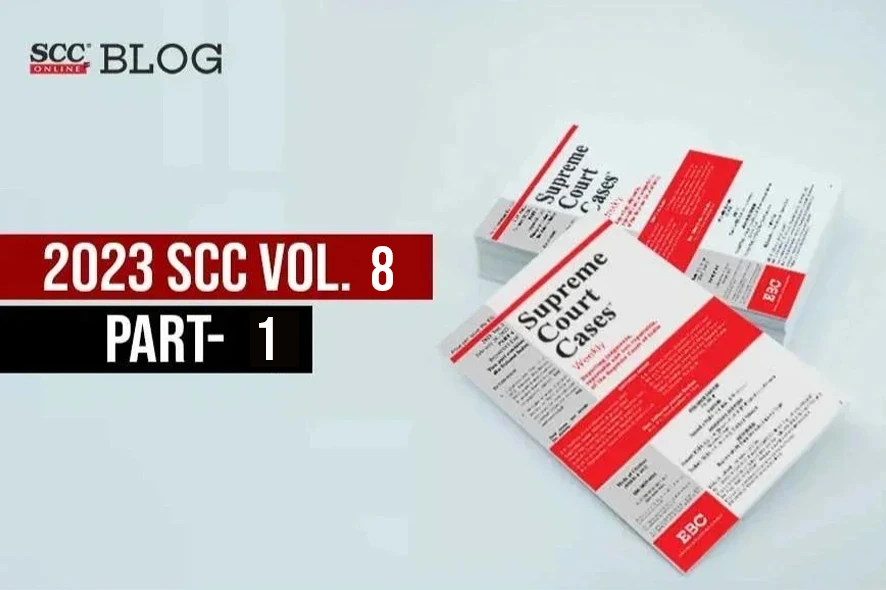Advocates — Senior Advocates — Designation of: Guidelines issued by Supreme Court in Indira Jaising, (2017) 9 SCC 766 for greater objectivity and transparency, modified. [Indira Jaising v. Supreme Court of India, (2023) 8 SCC 1]
Arbitration and Conciliation Act, 1996 — Ss. 11 & 8 and Ss. 11(6) & 11(6-A) — Jurisdiction of Referral Court at pre-referral stage — Scope: Matters that may be, and matters that must be determined by the Court and necessity of determination of existence and validity of arbitration clause, explained. [Magic Eye Developers (P) Ltd. v. Green Edge Infrastructure (P) Ltd., (2023) 8 SCC 50]
Companies Act, 2013 — S. 140(5): Enquiry/Proceedings initiated under S. 140(5) is not terminable on resignation and/or discontinuance of auditor. Relevance of consequences in addition to those provided under first part of S. 140(5), namely, under second proviso and necessity of passing of a final order for imposition of consequences/punishment under S. 140(5) second proviso, explained. [Union of India v. Deloitte Haskins & Sells LLP, (2023) 8 SCC 56]
Constitution of India — Art. 137 — Power of review: Conditions required to be satisfied for exercise of power of review, explained. [Arun Dev Upadhyaya v. Integrated Sales Service Ltd., (2023) 8 SCC 11]
Corporate Laws — Company Law — Winding up and Liquidation — Property tax and water tax: Obligation of purchaser vis-à-vis official liquidator towards post liquidation liability of a wound-up company. [Iisco Ujjain Pipe & Foundry Co. Ltd. (Official Liquidator) v. Ujjain Nagar Palika Nigam, (2023) 8 SCC 138]
Criminal Law — Criminal Trial — Sentence — Principles for sentencing — Proportionality/Balancing of Aggravating and Mitigating Circumstances: Principle of proportionality should guide sentencing process. [Uggarsain v. State of Haryana, (2023) 8 SCC 109]
Evidence Act, 1872 — S. 115 — Approbate and Reprobate: Applicability of Doctrine of approbate and reprobate, explained. [Workmen v. Food Corpn. of India, (2023) 8 SCC 116]
Income Tax — Tax Deducted at Source (TDS)/Tax at Source (TAS): Penalty under S. 271-C(1)(a) of the IT Act, 1961 on account of belated remittance/payment/deposit of the TDS i.e. on mere delay in remittance of the TDS after deducting the same by the assessee is not leviable. The consequences on non-payment/belated remittance of the TDS would be under S. 201(1-A) and S. 276-B. Expression “fails to deduct” occurring in S. 271-C(1)(a) of the IT Act, 1961 does not amount to failure to deposit/pay (on time) the tax deducted. [US Technologies International (P) Ltd. v. CIT, (2023) 8 SCC 24]
National Green Tribunal Act, 2010 — Ss. 19, 14 and 15 — Adjudication of disputes: Compliance with principles of natural justice is proper mode of disposal and basis of decision of NGT. [Singrauli Super Thermal Power Station v. Ashwani Kumar Dubey, (2023) 8 SCC 35]
Specific Relief Act, 1963 — Ss. 15 and 10 — Specific performance — Conditional sale deed with a right of repurchase: Principles clarified relating to availability of right of vendor to assign the right of repurchase i.e. the right contained in sale deed to buy back the property. [Indira Devi v. Veena Gupta, (2023) 8 SCC 124]







